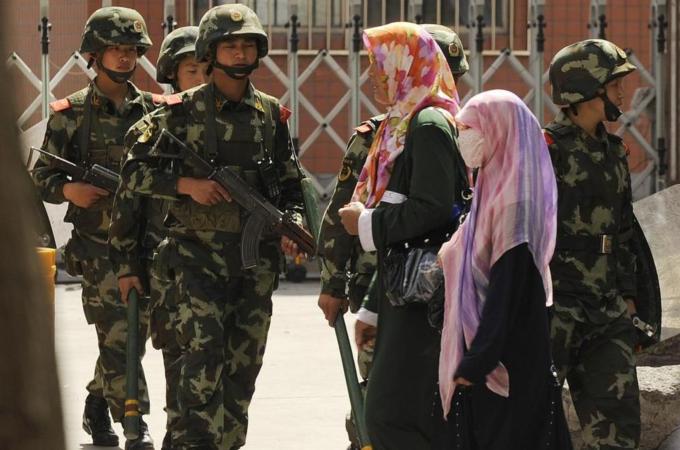Over the last year, there have been an increasing number of reports detailing the proliferation of re-education camps and the rise of a totalitarian police state in the Xinjiang region. The concept of re-education has existed since the advent of the People’s Republic of China. However, ever since former Tibet Party Secretary Chen Quanguo was installed in Xinjiang to replicate his perceived successes, Xinjiang’s re-education system alone grew to overshadow China’s officially-abolished re-education through labor system. Although the Chinese government denies the re-education camps’ existence, estimates peg (and likely underestimate) the number of Uyghurs detained at 120,000. Individuals can land in the camps for reasons such as contacting friends or relatives abroad, worshipping at mosques, or possessing Quranic verses on their phones; camps are designed to replace inmates’ Islamic beliefs with loyalty to the Party. Throughout such detention, individuals are wholly deprived of due process. The rise of cutting-edge facial recognition technology, most recently through Hikvision winning a Chinese government tender to install facial recognition cameras on 967 mosques, makes it all the easier to be placed in a re-education camp.
While observers have expressed alarm that Xinjiang may be functioning as a pilot region for surveillance, of increasing concern is the expansion of the Xinjiang model to non-Uyghur Muslims such as the Hui and ethnic Kazakhs. The Hui minority group, traditionally treated with more acceptance by the Chinese government due to their higher levels of cultural and linguistic assimilation with the Han majority, have found themselves subject to increasingly greater levels of scrutiny. In Linxia, a hub for Hui Muslims in Western China, the CCP had already removed call-to-prayer loudspeakers from 355 mosques last fall, citing noise pollution, and has now banned minors under 16 from studying the Koran or participating in religious activity. AFP’s Becky Davis reports that Hui individuals now live in a constant state of fear and despair:
“The winds have shifted” in the past year, explained a senior imam who requested anonymity, adding: “Frankly, I’m very afraid they’re going to implement the Xinjiang model here.”
[…] “They want to secularise Muslims, to cut off Islam at the roots,” the imam said, shaking with barely restrained emotion. “These days, children are not allowed to believe in religion: only in Communism and the party.”
[…] “We’re scared, very scared. If it goes on like this, after a generation or two, our traditions will be gone,” said Ma Lan, a 45-year-old caretaker, tears dripping quietly into her uneaten bowl of beef noodle soup.
Inspectors checked her local mosque every few days during the last school holiday to ensure none of the 70 or so village boys were present. Their imam initially tried holding lessons in secret before sunrise but soon gave up, fearing repercussions.
Instead of studying five hours a day at the mosque, her 10-year-old son stayed home watching television. He dreams of being an imam, but his schoolteachers have encouraged him to make money and become a Communist cadre, she said. [Source]
https://twitter.com/joshchin/status/1018806670925783040
Another group that has now been subject to increased scrutiny are China’s ethnic Kazakhs, who number over one million in Xinjiang, and may now be considered “potential confederates” of the Uyghurs. A Kazakh source with close ties to the Urumqi police claimed that the authorities had to detain a quota of 3,000 Kazakhs or Uyghurs per week.
Currently, an ongoing Kazakh court case is attracting attention as defendant Sayragul Sauytbay–an ethnic Kazakh Chinese national who illegally entered Kazakhstan to reunite with her family–claimed that as a state employee in an re-education camp, she knew that it held 2,500 ethnic Kazakhs. For more on the situation, see a report from Christopher Rickleton and Ben Dooley at the AFP.
As for the exiled Uyghur community, despite their living abroad, Beijing has attempted to exert control on some members. BuzzFeed News’ Megha Rajagopalan described how some exiled Uyghurs are being induced into spying for the government, lest their China-based family members be sent to re-education camps without due process:
Every person interviewed for this article said state security operatives told them their families could be sent to, or would remain in, internment camps for “reeducation” if they did not comply with their demands. It was a campaign, they said, that aimed not only to gather details about Uyghurs’ activities abroad, but also to sow discord within exile communities in the West and intimidate people in hopes of preventing them from speaking out against the Chinese state.
“China’s now got the capacity and willingness to reach out across sovereign borders to influence the behavior of others,” said James Leibold, an associate professor at La Trobe University in Australia. “With Chinese citizens of Chinese heritage, they may want to win them over, but with Uyghurs they want to squash them. Their willingness to do this is not only in a covert way, but now increasingly in an overt way.”
[…] State security operatives approaching Uyghurs abroad for information on their communities has become so common that it has sowed a deep mistrust in these overseas communities and a pervasive feeling of being watched, those interviewed for this article said.
[…] The lack of trust has impeded efforts toward activism abroad, even as many Uyghur groups are seeking to pressure Western governments to push back on China’s use of mass surveillance and reeducation camps through large political demonstrations.
“The catalyst for the mistrust is China’s deploying a wide network of spies amongst the Uyghur community,” said one exile in Sydney. “This mistrust plays out as a hurdle to cooperation between different individuals and groups in political activism.” [Source]
For more CDT coverage on Xinjiang, click here.








